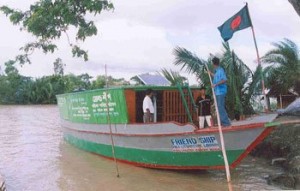Grameen Shakti Solar Renewable Power

www.sourcewatch.org/Renewable_energy
www.rightlivelihood.org/grameen_shakti.html
www.gshakti.org Solar
Muhammad Yunus (Bangla: মুহাম্মদ ইউনুস, pronounced Muhammôd Iunus) (born 28 June 1940) is a Bangladeshi banker, economist and Nobel Peace Prize recipient. He previously was a professor of economics where he developed the concepts of microcredit and microfinance. These loans are given to entrepreneurs too poor to qualify for traditional bank loans. Yunus is also the founder of Grameen Bank. In 2006, Yunus and the bank were jointly awarded the Nobel Peace Prize, „for their efforts to create economic and social development from below.“Yunus himself has received several other national and international honors. He is the author of Banker to the Poor and a founding board member of Grameen America and Grameen Foundation. > HERE < The Grameen Bank is a microfinance organization and community development bank started in Bangladesh that makes small loans (known as microcredit) to the impoverished without requiring collateral. The system is based on the idea that the poor have skills that are under-utilized. The bank also accepts deposits, provides other services, and runs several development-oriented businesses including fabric, telephone and energy companies. The organization and its founder, Muhammad Yunus, were jointly awarded the Nobel Peace Prize in 2006. Read More: > HERE <
Grameen Shakti (GS) has developed one of the most successful market based program with a social objective for popularizing Solar Home Systems (SHSs) including other renewable energy technologies to millions of rural villagers.
Currently GS is one of the largest and fastest growing rural based renewable energy companies in the world. And Bangladesh, a country with one of the most successful renewable energy program in the world. As of December 2009, GS has installed more than 3,20,000 SHSs in rural areas with more than 12,000 SHSs installed per month. This success especially was the result of unique approach, blending market and social forces together to take world’s most up to date technology to the rural people.
„It is a fact that the future belongs to Renewable Energy Technologies. But unless this technology can reach the millions of rural people who suffer most from the energy crisis, it will not reach its full potential, and neither will the economic and social problems of the world be solved. — Dipal Barua
GS used its Grameen Bank’s experience to evolve a financial package based on installment payment which reduced costs and helped it to reach economy of scale. GS had to earn the good will of the rural people and especially provide excellent after sales services to ensure the success of its program. GS engineers are also called social engineers. GS engineers train women technicians and provide them with employment, they administer a scholarship program for school children, they collect damaged batteries to ensure that these do not hurt the environment. GS engineers pay monthly visits to households during installment payment and ready to offer their services for a small fee, afterwards, if a client signs an annual maintenance agreement with GS.
„It is a fact that the future belongs to Renewable Energy Technologies. But unless this technology can reach the millions of rural people who suffer most from the energy crisis, it will not reach its full potential, and neither will the economic and social problems of the world be solved. — Dipal Barua
GS solar PV program really took off the ground when rural clients realized SHSs are more cost effective than other conventional sources of energy such as kerosene and provide more utilities.
GS started its biogas program in 2005 and Improved Cook Stoves Program in 2006. GS’s biogas program is the first market based program in Bangladesh. Both programs have become popular with the rural people and show an accelerating trend.
Rural electrification through solar PV technology is becoming more popular, day by day in Bangladesh. Solar Home Systems (SHSs) are highly decentralized and particularly suitable for remote, inaccessible areas. GS’s solar program mainly targets those areas, which have no access to conventional electricity and little chance of getting connected to the grid within 5 to 10 years. It is one of its most successful programs. Currently, GS is one of the largest and fastest growing rural based renewable energy companies in the world. GS is also promoting Small Solar Home System to reach low income rural households.
SHSs can be used to light up homes, shops, fishing boats etc. It can also be used to charge cellular phones, run televisions, radios and cassette players. SHSs have become increasingly popular among users because they present an attractive alternative to conventional electricity such as no monthly bills, no fuel cost, very little repair, maintenance costs, easy to install any where etc.
GS installed SHSs have made a positive impact on the rural people. GS has introduced micro-utility model in order to reach the poorer people who cannot afford a SHS individually. Another successful GS venture is Polli Phone which allows people is off grid areas the facilities of telecommunication through SHS powered mobile phones.
Comments are closed.